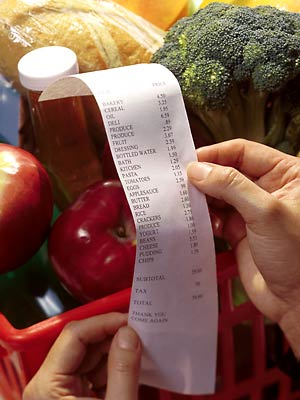Groceries can make up a significant portion of our monthly budget. Saving money on groceries can take a little more time, but in the long run it will not only save you money, but likely will end up making your meals and snacking healthier. Here are some tips on how to spend less money on groceries and eat healthier!
Groceries can make up a significant portion of our monthly budget. Saving money on groceries can take a little more time, but in the long run it will not only save you money, but likely will end up making your meals and snacking healthier. Here are some tips on how to spend less money on groceries and eat healthier!
Have a plan: It can’t hurt to know what you plan on making for the week and also what’s on sale. Planning a menu for the week, or at least a few big meals to tide you over can go a long way. This also saves you from having to return to the store or eat out during the week, saving you time and money.
Use your math skills: Sometimes the largest container is not the best deal. If you can afford the time, and the money to buy a larger portion, it can be a good idea to calculate what the best price/weight is. Some stores will list this, other times its up to us to calculate this. Either using our math skills or a calculator can go a long way.
Shop alone: This isn’t always a possibility. But if you can manage to shop alone it allows you to focus on getting the best deals and staying true to your list. It also allows you to take the time needed to shop for what you need without suggestions or pleas for additional items. Shopping with whoever shares the cooking responsibilities, if there is someone else, can be of aid as long as you’re able to focus and seek economical options.
Buy generic options: These products are available for almost every product out there, and they are held to the same standards as the name-brands but allow you to save money.
Buy in season: Produce can be one of the most expensive parts of your grocery bill. The best way to cut down the cost without sacrificing nutritiion is to buy in season produce. For instance, winter months often bring excellent prices for broccoli, winter squash and certain citrus fruits. Late summer often brings along great prices on berries and leafy greens. Buying produce when it is in season and then storing it (freezing, baking, pureeing, canning, etc) can help to cut costs later in the year when an item may be more expensive.
Buy in Bulk: Buying many non-perishable items in the unpackaged form can save you money and allows you greater options for mixing and matching certain items. Although this is usually a great option it is not always the best deal so it is a good thing to keep an eye on prices. If you go to a store like Bulk Barn, make sure to go with a list, and a full stomach, to keep costs down.
Buy Whole Foods: Healthier and often cheaper, the unprocessed versions of foods can save you money. Think of buying a block of cheese versus shredded cheese, or buying raw almonds and roasting them yourself. Not only do you save money but you also get control over what is added into your food.
Make smart substitutions: You’ll often find that by being open to substituting certain flavors or brands for others, you should be able to take advantage of more deals. If you and your family really love to eat cereal at breakfast, substituting oatmeal that is steel cut or quick cook (with cinnamon or fresh fruit to make it even more delicious) for instant oatmeal packages can save you money.
Have a plan: It can’t hurt to know what you plan on making for the week and also what’s on sale. Planning a menu for the week, or at least a few big meals to tide you over can go a long way. This also saves you from having to return to the store or eat out during the week, saving you time and money.
Use your math skills: Sometimes the largest container is not the best deal. If you can afford the time, and the money to buy a larger portion, it can be a good idea to calculate what the best price/weight is. Some stores will list this, other times its up to us to calculate this. Either using our math skills or a calculator can go a long way.
Shop alone: This isn’t always a possibility. But if you can manage to shop alone it allows you to focus on getting the best deals and staying true to your list. It also allows you to take the time needed to shop for what you need without suggestions or pleas for additional items. Shopping with whoever shares the cooking responsibilities, if there is someone else, can be of aid as long as you’re able to focus and seek economical options.
Buy generic options: These products are available for almost every product out there, and they are held to the same standards as the name-brands but allow you to save money.
Buy in season: Produce can be one of the most expensive parts of your grocery bill. The best way to cut down the cost without sacrificing nutritiion is to buy in season produce. For instance, winter months often bring excellent prices for broccoli, winter squash and certain citrus fruits. Late summer often brings along great prices on berries and leafy greens. Buying produce when it is in season and then storing it (freezing, baking, pureeing, canning, etc) can help to cut costs later in the year when an item may be more expensive.
Buy in Bulk: Buying many non-perishable items in the unpackaged form can save you money and allows you greater options for mixing and matching certain items. Although this is usually a great option it is not always the best deal so it is a good thing to keep an eye on prices. If you go to a store like Bulk Barn, make sure to go with a list, and a full stomach, to keep costs down.
Buy Whole Foods: Healthier and often cheaper, the unprocessed versions of foods can save you money. Think of buying a block of cheese versus shredded cheese, or buying raw almonds and roasting them yourself. Not only do you save money but you also get control over what is added into your food.
Make smart substitutions: You’ll often find that by being open to substituting certain flavors or brands for others, you should be able to take advantage of more deals. If you and your family really love to eat cereal at breakfast, substituting oatmeal that is steel cut or quick cook (with cinnamon or fresh fruit to make it even more delicious) for instant oatmeal packages can save you money.
| The biggest tip to save money when you’re at the grocery store is likely one you have already heard. Don’t shop hungry! That is the worst thing that can be done while shopping. If you do have to go shopping while hungry, buy a quick snack to munch on while you shop, a piece of fruit and some nuts or a small greek yogurt are great ideas. Otherwise we become the slaves to our low blood sugar and the grocery bill will show it. Happy Shopping!! |


 RSS Feed
RSS Feed
